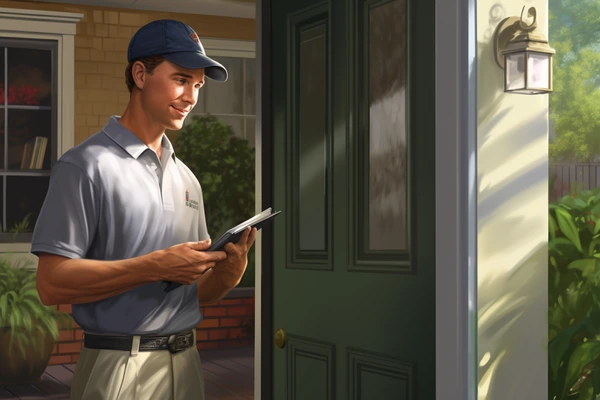
Florida state law requires that anyone engaging in “home solicitation” first obtain a permit from their county.
A “home solicitation sale” is defined as any sale or rental of consumer goods or services which meets all of the following three conditions:
- The total price is at least $25 (including all interest, fees, service charges, finance charges, shipping costs, insurance, etc, and regardless of whether the price is part of a single contract or split across multiple contracts),
- The seller (or seller’s agent) engages in a personal solicitation for the sale or rental at a place other than at the seller’s fixed location business establishment where goods or services are offered or exhibited for sale or rental (e.g. at the buyer’s home or a public park), and
- The buyer’s agreement or offer to purchase is given to the seller, and the sale or rental is consummated at a place other than at the seller’s fixed location business establishment (e.g. a transaction unsolicited by the consumer and consummated by telephone would satisfy this condition).
However, the following 3 categories of transactions are EXCLUDED from the definition of home solicitation sale:
- A sale or rental made at any fair or similar commercial exhibit,
- A sale or rental that results from a request for specific goods or services by the purchaser or lessee,
- A sale made by a licensed motor vehicle dealer which occurs at a location or facility open to the general public or to a designated group.
Additionally, the following four types of sellers may technically be engaging in home solicitation sales, but they are exempt from the permitting requirements of F.S. 501.022.
- Certain B2B soliciters. Salespersons making calls or soliciting orders at the usual place of business of a customer, regarding products or services for use in connection with the customer’s business.
- Cold callers. Telephone salespersons making calls that are unsolicited by the consumer and consummated by telephone, without any other contact between buyer and seller prior to delivery of the goods or performance of the services.
- Salespersons conducting a sale or rental of consumer goods or services by sample, catalog, or brochure for future delivery. Future delivery means delivery more than 3 business days after the buyer signs an agreement or offer to purchase. Business day means any calendar day except Sundays or a federal holiday (Saturdays are business days).
- Sellers (or seller representatives) that are regulated as to the sale of goods and services by Chapter 475 or 497. Examples of such sellers include real estate brokers and agents, real estate appraisers, funeral directors, and funeral service providers.
Local Laws
In addition to the state-level requirement to obtain a county permit for home solicitations, local municipalities can (and often do) impose additional permitting and/or licensure requirements. It’s also worth noting that many municipalities define “solicitation” or “home solicitation” as something broader than the state level definition above.
References
[1] F.S. 501.021 Home solicitation sale; definition
[2] F.S. 501.022 Home solicitation sale; permit required
[3] F.S. 501.025 Home solicitation sale; buyer’s right to cancel
[4] F.S. 501.031 Home solicitation sale; written agreement
[6] F.S. 501.041 Home solicitation sale; restoration of down payment
[7] F.S. 501.045 Home solicitation sale; duty of buyer
[8] F.S. 501.046 Home solicitation sale; duty of businesses conducting home solicitation sales
[9] F.S. 501.047 Home solicitation sale; prohibited practices
[10] F.S. 501.052 Home solicitation sale; enforcement authority; injunctive relief
[11] F.S. 501.053 Home solicitation sale; judicial review